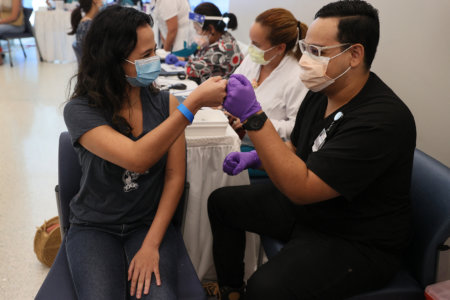
As an international student, you probably chose (or will choose) your study abroad destination based on the following: the programme structure, the university-specific offerings, and the benefits of studying in that chosen country.
However, one of the most important factors that is often overlooked is the healthcare benefits you get during your stay in the country.
Having healthcare benefits is crucial for international students. Simply put, it ensures that you have access to medical services when needed.
Healthcare benefits can cover the cost of medical treatments and prescriptions, which can be expensive without insurance. It was found that healthcare costs are a huge concern for international students studying in the US, with 58% reporting that they were worried about their ability to pay for medical expenses.
These healthcare benefits help with preventative care, such as vaccinations and regular check-ups. This plays a crucial part in keeping you healthy and avoiding more serious health problems down the line.

If you don’t have access to healthcare benefits, you may have to delay or forgo medical treatments. Source: AFP
What happens if you don’t have healthcare benefits
When you don’t have proper healthcare coverage in the country you are studying in, it can lead to some challenges and risks. Here’s what could happen:
- Limited access to healthcare services: Without proper coverage, you might find it difficult to access healthcare services when you need them. This means you might have to delay or forgo medical treatment for illnesses or injuries.
- Financial burden: Healthcare costs can be very high, especially in countries without universal healthcare systems. Without coverage, you could end up facing hefty medical bills that you might struggle to pay off.
- Legal issues: Some countries require international students to have health insurance as a condition of their visa or residence permit. If you don’t have the required coverage, you could face legal issues, such as fines or even deportation.
8 countries offering the best healthcare benefits to international students
1. UK
As an international student in the UK, you can access healthcare through the National Health Service (NHS). The NHS provides a wide range of healthcare services, from doctor’s appointments to emergency treatment, and it’s available to everyone residing in the UK, including international students.
To access NHS healthcare, you must register with a local doctor, such as a General Practitioner (GP). This process involves filling out a registration form and providing proof of your address. Once registered, you can book appointments with your GP for any health concerns you may have.
One of the great things about NHS healthcare is that many services are free. This means you won’t have to pay for routine appointments with your GP or emergency treatment at a hospital. However, there may be charges for certain services, such as prescription medications or dental treatment.
2. Australia
In Australia, international students are eligible for healthcare benefits through the Overseas Student Health Cover (OSHC) scheme.
With OSHC, you can receive coverage for essential medical services such as visits to the doctor, hospital treatments, prescription medicines, and emergency ambulance transport. This coverage helps you stay healthy and worry-free during your time in Australia.
To sign up for OSHC, most universities will arrange it for you as part of your enrollment process. The cost varies depending on the level of coverage and the duration of your stay. It can range from around 437 AUD to 2,600 AUD per year (approximately US$290 to US$1720), depending on the provider and the type of policy you choose.
The Australian government states that all international students must have OSHC for the entire duration of their stay in the country. This requirement ensures you have access to quality healthcare services without financial burdens in case of illness or injury.

Access to healthcare benefits will cover basic medical services like doctor’s visits, hospital stays, and emergency care. Source: AFP
3. Canada
As an international student in Canada, you’re eligible for healthcare services through several options depending on the province you’re studying in.
A common option is the provincial health insurance plan, which covers basic medical services like doctor’s visits, hospital stays, and emergency care. For example, in Ontario, international students can enrol in the Ontario Health Insurance Plan (OHIP); in British Columbia, students can opt for the Medical Services Plan (MSP) instead.
To sign up for these plans, you must meet certain eligibility criteria, such as having a valid study permit and being enrolled in an educational institution. The cost varies depending on the province and your situation, but it’s typically a monthly or annual fee.
Many universities and colleges also offer supplementary health insurance for international students. These plans often cover services not included in the provincial plans, such as prescription medications, dental care, and vision care.
According to the Canadian Bureau for International Education (CBIE), around 57% of international students in Canada have some form of health insurance provided by their educational institution.

Healthcare coverage will take care of services such as doctor visits, hospital stays, laboratory tests and prescription medications. Source: AFP
4. Japan
Japan offers more than just picturesque views and a high quality of life to its international students — here, you’ll get to select which one of its various healthcare benefits suits your needs best.
The National Health Insurance (NHI), available to international students in a Japanese university, covers many medical services, including doctor visits, hospital stays, surgeries and prescriptions. The cost varies depending on your location, coming up to around 3,000 to 5,000 JPY (approximately US$19.50 to US$ 32.50) per month.
On the other hand, Japanese universities often have on-campus university health services such as health centres or clinics. These facilities offer basic medical services and consultations to students, though some services may come at a separate fee.
Alternatively, international students in Japan can opt for private health insurance if they’re looking for something with more comprehensive coverage. There are various plans available and each one is tailored to the different needs and wants of individuals.

Studying abroad is expensive enough; imagine having to fork out money for your health as well. Source: AFP
5. Germany
Having health insurance is mandatory for everyone in Germany. This means that as an international student in the country, you can access the same healthcare services as German citizens.
There are two types of health insurance available: statutory health insurance and private health insurance.
The statutory health insurance is a public insurance and is the most common option for international students and German residents due to its affordability. Costing around 80 to 100 EUR (approximately US$86 to US$108) per month, it covers various healthcare services like hospital stays, medications and treatments.
However, you’ll have to co-pay for some services, like doctor visits or prescriptions, but it’s usually a small amount.
Those with specific needs or preferences can opt for private health insurance instead as it comes with customised plans with additional perks like quicker access to specialists or private hospital rooms. The cost of private insurance can vary based on your age, health condition, and coverage needs.
6. France
France is another excellent option if you seek quality healthcare benefits while studying abroad. The French healthcare system is renowned for its high standards and accessibility.
To access healthcare benefits in France, you’ll need to register with the French social security system. This process involves obtaining a French social security number, which you can do through your university or the local social security office (Caisse Primaire d’Assurance Maladie, or CPAM).
Once registered, you’ll receive a Carte Vitale, which is your health insurance card. You’ll use this card when visiting healthcare providers to claim reimbursement for medical expenses.
The French social security system covers many healthcare services, including doctor visits, hospital stays, laboratory tests, and prescription medications.
You can also purchase supplemental health insurance (mutuelle) to cover additional costs or services not included in the basic coverage.

Healthcare benefits will cover any medications or vaccinations you need to get while studying abroad. Source: AFP
7. Norway
Norway’s healthcare system is renowned globally for its quality and accessibility. The country invests significantly in healthcare, ranking fourth in healthcare spending among OECD countries.
As an international student staying in Norway for over a year, you will be eligible for coverage under the National Insurance Scheme. This scheme provides essential healthcare services, including doctor visits, hospital care and medications, at little to no cost.
To access these benefits, you must register with the Norwegian Tax Administration and obtain a Norwegian ID number. Once registered, you’ll receive a Norwegian Health Insurance Card, which you can use to access healthcare services.
However, take note that dental care is not covered under the scheme, so you may need to purchase separate dental insurance or pay for dental treatments on your own.

South Korea is one of the top countries offering good healthcare benefits for international students. Source: AFP
8. South Korea
South Korea is one of the leading countries in the world in terms of healthcare. The country is committed to providing accessible and high-quality care to not only its citizens but international students as well.
When it comes to healthcare coverage, international students can benefit from the National Health Insurance Service (NHIS). This scheme gives you access to several medical services, including consultations, treatments, and prescriptions. The cost of NHIS coverage is typically included in your student fees or may require a separate enrollment fee, depending on your university or programme.
While the majority of your healthcare needs are covered under the NHIS, there may still be out-of-pocket expenses for certain medical services.










